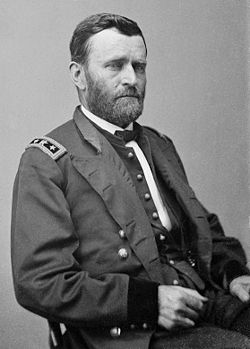 |
| Grant |
Over the past three years of civil war the Union had been plagued with bad generals, especially in the east, where a series of them had been defeated by the Army of Northern Virginia. But they had at least one successful army commander, and that was Ulysses S. Grant. Grant had begun the war under inauspicious circumstances, a prewar military career had ended with his resignation under charges of drunkenness. Back in the army, he performed very well, capturing Fort Henry and Fort Donelson and then marching into Tennessee. He beat off an attack at Shiloh, and after months of campaigning was able to capture the Confederate stronghold at Vicksburg, Mississippi. Moving to Chattanooga, he supervised the attacks that broke the siege of the town.
150 years ago today Grant got a reward for his successes. Congress had revived the rank of Lieutenant General, previously held only by George Washington and Winfield Scott, who had it by brevet. Grant was given this rank, and with it the command of all the Federal armies. It was hoped that he could develop a cohesive strategy that would lead the Union its to long-sought victory.
 |
| Missionary Ridge |
In his report written over a year after his appointment, Grant said:
The resources of the enemy and his numerical strength were far inferior to ours; but as an offset to this, we had a vast territory, with a population hostile to the Government, to garrison, and long lines of river and railroad communications to protect, to enable us to supply the operating armies.
The armies in the East and West acted independently and without concert, like a balky team, no two ever pulling together, enabling the enemy to use to great advantage his interior lines of communication for transporting troops from east to west....
From the first, I was firm in the conviction that no peace could be had that would be stable and conducive to the happiness of the people, both North and South, until the military power of the rebellion was entirely broken. I therefore determined, first, to use the greatest number of troops practicable against the armed force of the enemy, preventing him from using the same force at different seasons against first one and then another of our armies, and the possibility of repose for refitting and producing necessary supplies for carrying on resistance; second, to hammer continuously against the armed force of the enemy and his resources, until by mere attrition, if in no other way, there should be nothing left to him but an equal submission with the loyal section of our common country to the constitution and laws of the land. These views have been kept constantly in mind, and orders given and campaigns made to carry them out.
His plan was for Sherman to lead the attack on one of the main Confederate armies, that of Joseph E. Johnston, while George Meade pressed on the other, that of Robert E. Lee. Although Meade remained in command, Grant would be on hand to directly supervise him. Smaller movements were also planned, such as Franz Sigel's into the Shenandoah Valley and Nathaniel Bank's Red River Campaign.
 |
| Grant |





0 comments:
Post a Comment